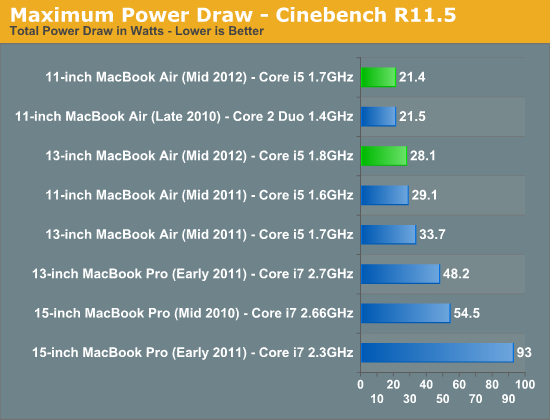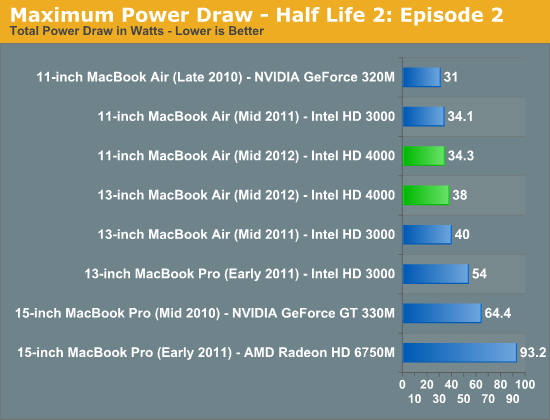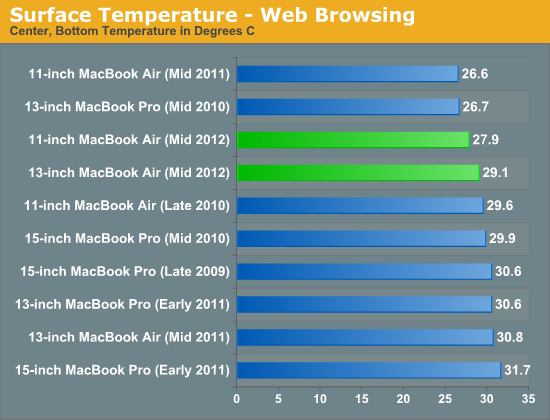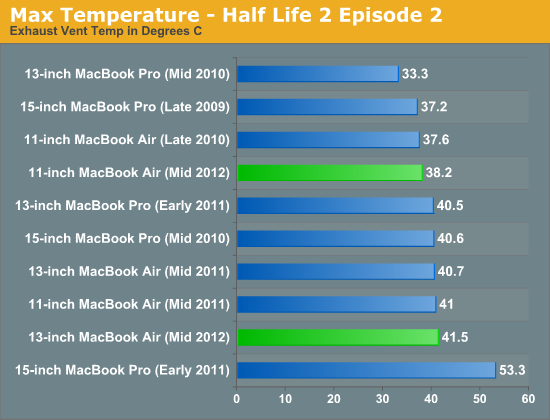The 2012 MacBook Air (11 & 13-inch) Review
by Anand Lal Shimpi on July 16, 2012 12:53 PM EST- Posted in
- Apple
- Mac
- MacBook Air
- Laptops
- Notebooks
Power Consumption & Thermals
I dug up my old power draw and thermal numbers from the 2011 MacBook Air review, retested the old models to ensure they still performed as expected, and added the 2012 models to the list.
First up is power consumption. Here we're measuring total system power consumption with the display running at max brightness and the battery fully charged. We are forced to use a different power adapter for the 2012 MacBook Airs so there may be some variance here but the power rating remains the same.

Cinebench shows a real reduction in power consumption under load. This is exactly what we expect to see from Ivy Bridge, which should translate into better battery life numbers.

The power savings are basically non-existant under HL2ep2, but you have to keep in mind that the HD 4000 is able to deliver over 70% better performance at roughly the same power level as the HD 3000.
Surface temperatures haven't changed all that much, at idle the 11-inch system measured a bit cooler than its predecessor while the 13 was within a degree.

Under load these things can get hot - despite the power savings it looks like the base of the chassis gets roughly as warm as it did last year. There's only so much you can do with a tiny chassis and a single fan. Note that during my Diablo III benchmarking pass I measured 45C just north of the F2 key on the keyboard on the 13-inch MBA.











190 Comments
View All Comments
name99 - Tuesday, July 17, 2012 - link
The most likely reason for the USB3 problems is devices that are just slightly out of spec, demanding more power than USB3 can deliver. The larger rMBP is willing to give them this extra power, the smaller MBAs cannot.This is a very common problem these days with flash storage. Look at a table of the power demands of various disks for either startup or sustained writes --- it is depressing how many are almost (but just over) the USB3 limit --- and there are plenty of manufacturers (yeah, OCZ, I'm looking at you) who are quite willing to sell you a "USB3" drive which kinda sorta appears to run until you generate a long series of sustained writes at which point it hangs.
So why does the failure for these drives appear at plugin time?
One possibility is that they need a burst of juice to start themselves going, another is that they negotiate with the host and can't negotiate as much power as they want. (I don't know the USB3 power negotiation protocol.)
It would be an interesting experiment, IMHO, for Anand to try the problematic devices again with a Y cable that could deliver extra USB power from a second port.
jospoortvliet - Wednesday, July 18, 2012 - link
On a related note - neither can anyone sell the nice magsafe(2) adaptors, it seems. Quite annoying - I don't really get why it's legal that Apple can stop others from making those? I get they have patents on it, but wasn't the idea of the patent system to ensure inventors get decently renumerated, not to let them block others from using their inventions? I thought you HAVE to license your patents for a 'reasonable' fee... Still, all other laptops come without a magsafe-like plug...Romberry - Tuesday, July 17, 2012 - link
...or drowning in Kool-Aid. Apple cripples other OS's on their hardware (and does so for no good technical reason at all.) See my previous comment for more. Or take a look at Ed Bott's recent article on another site concerning battery life on a Mac running Windows. Or fire up Google.KPOM - Tuesday, July 17, 2012 - link
Here's what Ed Bott said:"I don’t blame Apple for this terrible performance. They’ve focused their engineering resources on their own hardware and their own operating system. For Apple, Boot Camp is a tool to use occasionally, when you need to run a Windows program without virtualization software getting in the way."
It's always been obvious that Boot Camp drivers are subpar, though it is getting better. However, most people aren't buying Macs to run Windows as the primary OS. They do enough to get Windows running occasionally, but they rightfully spend their time and effort optimizing their hardware for OS X. What's the issue there?
Incidentally, the new Boot Camp drivers do enable AHCI support, so TRIM, etc. will work in Windows 7 and Windows 8. They also generally deliver decent performance (the Core i7 bug notwithstanding). Apple doesn't need to make Boot Camp available at all.
Spunjji - Tuesday, July 17, 2012 - link
No good technical reason, for sure. Business reasons, on the other hand... There are many people out there who don't get the technical side of it, they just get what works and what doesn't. They see Windows running poorly on the same hardware, so they assume that with all things being equal that Windows is the source of the problem. Makes a simple kind of sense unless you know that Apple are responsible for tying the 2 together. They could easily do it properly, but they never will. Because they're Captialist Pigs! Yaaayyy! :DFreakie - Tuesday, July 17, 2012 - link
Wait wut... Are you being sarcastic? o_O It's not Apple's choice to allow other OS's on their laptop, it's the hardwork of the programmers for the other OS's that allow their OS's to be compatible with an incredibly large range of hardware. Unlike OSX which can't even figure out it's own small range of hardware. It's out of Microsoft's own decision that it can run on non-partnered computers that you build yourself, or buy from a company that doesn't make Windows computers. In fact. Apple puts specific features in OSX to make it not run on any hardware but theirs and users have to hack in order to get it to run on anything else.Apple should be hanged for their nonexistent allowances of other OS's.
KPOM - Tuesday, July 17, 2012 - link
Uh, without Boot Camp, it would be very difficult to run Windows, because Windows doesn't support Apple's implementation of EFI (which predates Windows' support for UEFI). Also, they do write drivers for their components. Microsoft's stock drivers don't support all the hardware used.Freakie - Tuesday, July 17, 2012 - link
Yes, Microsoft uses a new, more advanced, and completely 64bit compatible version of EFI. Just because Apple did it first, doesn't mean they somehow do it better now xP Though from what I've seen, the ability to put Windows on a Mac without any modifications isn't a fault of Windows, but differences between the two OS's as well as Apple's insistence of only allowing Windows on their system under their own terms. If Apple was more open about things, then hackers would have had to work less =PI also never said they didn't write their own drivers? o_O I mean, they obviously don't write all of their own drivers 100%, as I am sure that the hardware manufacturers have to give them something to start with.
And Microsoft's stock drivers are actually quite impressive. Of course they can' support every little peripheral, but they do an amazing job of supporting a countless range of combinations of hardware. There is no doubt that Microsoft's view on how it develops drivers is much more open than Apple's. Microsoft support DIY builders and system integrators as well, while Apple does not.
KPOM - Tuesday, July 17, 2012 - link
Boot Camp came out before Windows supported EFI at all. Apple has no real incentive to switch to UEFI because it doesn't really offer significant benefits, and they'd have to modify UEFI anyway to keep OS X proprietary.My point wasn't about UEFI, though. It is about Apple enabling other operating systems to run on their computers. They actively added that capability when they didn't need to.
Your point about MS' openness vs. Apple is well known. Microsoft is primarily a software company. Up to now, they haven't cared whether you installed Windows 7 on an Apple, a Dell, HP, or something you built yourself. However, with Windows RT, they are going partly the Apple route, since they won't sell the OS separately, and will individually approve manufacturers and designs. So apparently even they recognize there are advantages to a closed model.
Spunjji - Tuesday, July 17, 2012 - link
"When they didn't need to" <- What nonsense is this? A market requirement translates as a need. They would have lost all of the customers out there who require genuine Windows applications running under non-virtualised Windows. This is a non-trivial portion of the market.Apple do not do anything out of the generosity of their hearts. What wealthy company does?